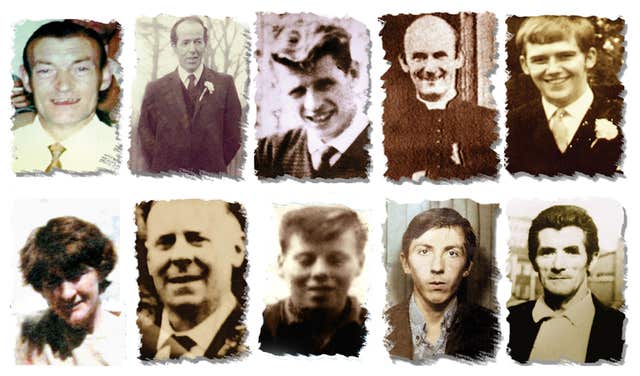
Ten people killed in west Belfast 50 years ago were “entirely innocent”, a coroner has ruled.
There was applause at Belfast Coroner’s Court as the findings were delivered following fresh inquests into the 10 deaths in Ballymurphy in August 1971, which included a mother-of-eight and a Catholic priest.
Presiding Coroner Mrs Justice Keegan acknowledged it was a chaotic time but ruled that the use of force by soldiers had been “disproportionate” in the nine deaths the Army was found to have been responsible for.
She ruled out any paramilitary involvement by any of those killed, and described them as “entirely innocent of any wrongdoing on the day in question”.
There was applause within the courtroom as she made that pronouncement.
Ten fresh inquests were heard in terms of the five incidents in which they occurred.
 (Top row L to R) Joseph Corr, Daniel Teggart, Eddie Doherty, Father Hugh Mullan, Frank Quinn, Paddy McCarthy, (Bottom row, L to R) Joan Connolly, John McKerr, Noel Philips, John Laverty and Joseph Murphy were shot dead in Ballymurphy in 1971 (Ballymurphy Massacre Committee/PA)
(Top row L to R) Joseph Corr, Daniel Teggart, Eddie Doherty, Father Hugh Mullan, Frank Quinn, Paddy McCarthy, (Bottom row, L to R) Joan Connolly, John McKerr, Noel Philips, John Laverty and Joseph Murphy were shot dead in Ballymurphy in 1971 (Ballymurphy Massacre Committee/PA)
Parish priest Father Hugh Mullan, 38, and Frank Quinn, 19, were shot in the Springfield Park area of Ballymurphy at around 9pm on August 9.
Around the same time, outside an Army barracks at the Henry Taggart Hall in Divismore Park, Noel Philips, 19, Joseph Murphy, 41, Joan Connolly, 44, and Daniel Teggart, 44, were fatally wounded by gunfire.
The following day, Eddie Doherty, 31, died after being shot in the Whiterock Road as he came across an encounter between soldiers and protesters who had erected a barricade across the road.
In the fourth incident, on the third day of shooting, Joseph Corr, 43, and John Laverty, 20, were shot in the Whiterock Road area in the early hours of the morning. Mr Corr died from his injuries 16 days later.
And later that morning former soldier John McKerr, 49, was shot later in Westrock Drive, close to Corpus Christi Church as he took a break from maintenance work. He died from his injuries on August 20.
Mrs Justice Keegan described the inquests as the longest running to date in Northern Ireland.
While outlining the context in which the deaths happened, in terms of the start of what has become known as the Troubles and the introduction of the policy of internment without trial on August 9, she said she assessed each incident on its own facts.
The standard of proof used was on balance of probability.
She noted that, 50 years on, the deaths remain “stark” for the families.



Why are you making commenting on The Herald only available to subscribers?
It should have been a safe space for informed debate, somewhere for readers to discuss issues around the biggest stories of the day, but all too often the below the line comments on most websites have become bogged down by off-topic discussions and abuse.
heraldscotland.com is tackling this problem by allowing only subscribers to comment.
We are doing this to improve the experience for our loyal readers and we believe it will reduce the ability of trolls and troublemakers, who occasionally find their way onto our site, to abuse our journalists and readers. We also hope it will help the comments section fulfil its promise as a part of Scotland's conversation with itself.
We are lucky at The Herald. We are read by an informed, educated readership who can add their knowledge and insights to our stories.
That is invaluable.
We are making the subscriber-only change to support our valued readers, who tell us they don't want the site cluttered up with irrelevant comments, untruths and abuse.
In the past, the journalist’s job was to collect and distribute information to the audience. Technology means that readers can shape a discussion. We look forward to hearing from you on heraldscotland.com
Comments & Moderation
Readers’ comments: You are personally liable for the content of any comments you upload to this website, so please act responsibly. We do not pre-moderate or monitor readers’ comments appearing on our websites, but we do post-moderate in response to complaints we receive or otherwise when a potential problem comes to our attention. You can make a complaint by using the ‘report this post’ link . We may then apply our discretion under the user terms to amend or delete comments.
Post moderation is undertaken full-time 9am-6pm on weekdays, and on a part-time basis outwith those hours.
Read the rules hereLast Updated:
Report this comment Cancel